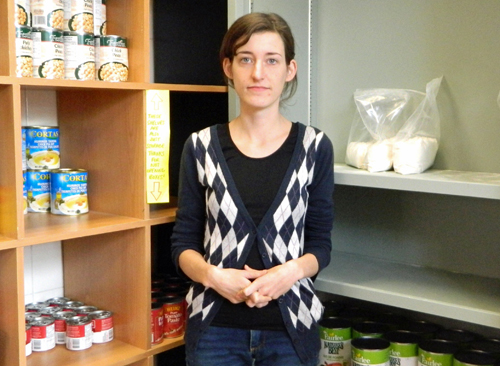
More than 620 people, including 47 children. That’s how many used the Central Student Association (CSA) Food Bank over the past few months, taking home emergency food items, and leaving the shelves and baskets barer than usual.
“We saw a 40 per cent increase in users during the month of September and the numbers stayed up in October too,” says CSA Food Bank coordinator Laura Simon, a recent studio arts graduate. “And many of those came back repeatedly, taking the maximum amount of food items.” In past years, students might use the food bank for a few meals until their OSAP payments came through, but this fall the demand has been steady – and high.
By November, the food bank had used up almost its entire annual budget for purchasing food. “We’re going into the New Year with only $2,000,” says Simon.
Unlike some other food banks, which rely primarily on donated food items, the CSA Food Bank purchases a significant amount of the food it provides to students. One reason is that they don’t want to compete for donated items with the other food banks in the City of Guelph; the other is that it allows them to offer healthier, more nutritious foods such as fresh produce, whole-grain breads and dairy products. Even the pantry items are primarily rice, beans, lentils, canned tomatoes and other nutritious ingredients. Personal hygiene products are also available.
In addition, the CSA Food Bank offers cooking classes and budgeting workshops, and has a student-created cookbook that is sold on a “pay what you can” basis.
“The food bank is intended to be an emergency service,” adds Simon. The rule in the past has been that people can take up to 30 items per month. With the growing demand and dwindling resources, that has been reduced to 20 items per month. While some food banks make up hampers for the people who use them, Simon explains that they have a “shopping set-up” that allows people to choose the items they want.
“We find that students don’t generally want to take a whole hamper full of food at once; they’d rather take a few items at a time,” she says. That’s more manageable for someone who may be walking or riding a bike home.
What’s been hardest, says Simon, is having to let people know they’ve run out of food. “We used to be able to keep up with the demand, but now we can’t,” she says. “We buy milk on Thursday and fill the fridge, and by Friday afternoon it’s all gone. It’s really hard when people come in and we know they have young children but there isn’t any milk left for them.”
Many food banks, both on and off campus, are facing a similar crisis, so just sending students in need to the city food banks isn’t a viable solution. Simon links this situation to the general recession, tuition increases and low levels of student employment over the past couple of summers. “Students are finding they just aren’t able to save any money over the summer.”
The students who need assistance from the CSA Food Bank include graduate, undergraduate and international students.
Some donations have already arrived from individuals, student clubs and faculty to help keep the food bank going, and that support has been hugely appreciated. More is needed, however.
Those who would like to donate money can write a cheque to the CSA and note “Food Bank” on the memo line. For those interested in donating food, the biggest needs are for large bags of rice and flour, canned beans, canned tomatoes, dried beans, soup, bouillon cubes, apple juice, oatmeal and granola bars. The large bags of rice, flour and beans are divided into smaller containers.
Purchasing a copy of the cookbook also provides a donation to the CSA Food Bank and makes a great holiday gift.